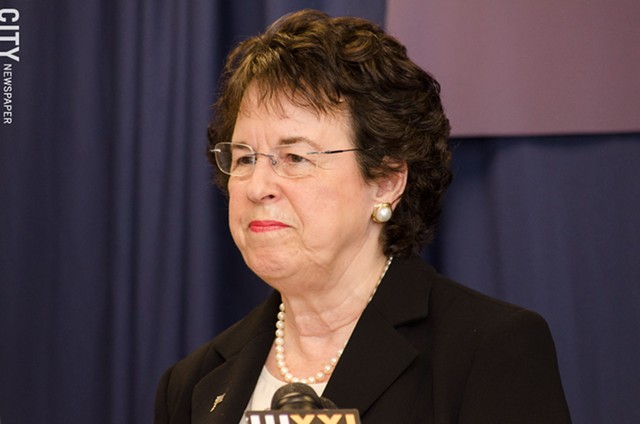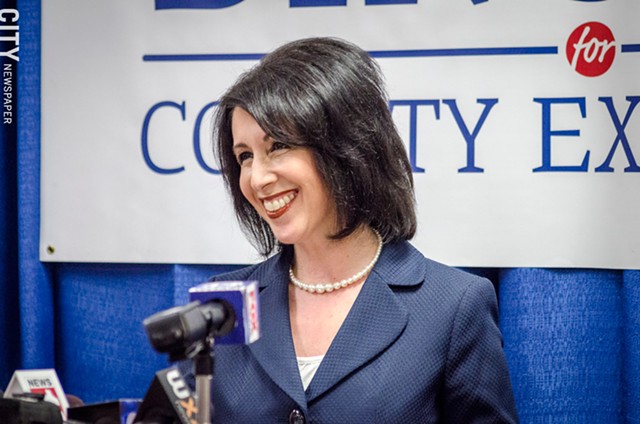This is a campaign?
We're endorsing Sandy Frankel for Monroe County executive and...Zzzz...God, this race is so boring.
By Jeremy Moule @jfmoule
[
{
"name": "500x250 Ad",
"insertPoint": "5",
"component": "15667920",
"parentWrapperClass": "",
"requiredCountToDisplay": "1"
}
]
So, the 2015 county executive race should be the political brawl of the decade.
Term limits prevent Maggie Brooks, the star Republican who's held the job for almost 12 years, from running for re-election, so the seat is wide open. And two experienced, well-known politicians want to take her place: County Clerk Cheryl Dinolfo, a Republican, and former Brighton Supervisor Sandy Frankel, a Democrat. They're joined in the contest by Green Party candidate Rajesh Barnabas.
Monroe County is at a make-or-break moment and will have to deal with some big, difficult issues over the next few years, including its own faltering finances and worsening poverty in some city neighborhoods.
But the next few years will also bring unprecedented opportunity for the county: millions of federal, state, and private dollars will be invested in the region, for example, as part of a national effort to build a domestic photonics manufacturing industry. The belief is that the endeavor will lead to new high-tech companies in the county and thousands of well-paying jobs.
The next exec will guide Monroe County through this pivotal time, and Dinolfo and Frankel have a chance to lead robust public discussions about strengthening the county's economy, making the county budget healthier, and improving working families' access to day care. But so far that hasn't happened.
This race has potential, but instead it's been a disappointing bore.
Dinolfo's campaigning like a favored incumbent. She shows up at festivals, marches in parades, and makes public appearances in her capacity as clerk; she's been to some 600 events, she says, since announcing her candidacy early this year. She hasn't indulged us with specifics on her plans for the county, though she says she'll keep the tax rate flat, eliminate quasi-governmental local development corporations, and form an Office of Public Integrity to review potential conflicts of interest around county contracts, employees, or officials.
She also hasn't engaged Frankel or Barnabas publicly; the Dinolfo camp seems to think that if it can keep voters from discovering that she has opponents, she'll win. The problem is that approach just might work.
The Frankel campaign has struggled with this treatment, and has tried to attract attention and fire up the party base by flailing on county scandals, including accusations of corruption in county government, nepotism, and pay-to-play favoritism. But the party's hammered on these issues in just about every county exec and legislature race over the past decade and gotten nowhere.
Look, these assessments seem harsh, but the November 3 election is three weeks away and it is past time for candor. Given the problems and possibilities ahead, Monroe needs an experienced leader who's up to the challenge.
Dinolfo's vision is thin, almost to the point that her promise to keep the property tax rate flat — which Frankel has also committed to — feels like her beginning and end. And Dinolfo also lacks executive and legislative experience. She may be trying to emulate Brooks' path from clerk to exec, but Brooks had also done time as a county legislator, even if it was only a year.
Frankel is the leader that Monroe County needs: she's intelligent, she has a deep understanding of important community issues, and she has valuable experience leading a local government. And while her campaign has been flawed, Frankel has presented detailed plans for addressing county finances, economic development, and violence in Rochester. For those reasons, City endorses Sandy Frankel for Monroe County executive. (Related story)
Frankel's better than the campaign she's running. Her record stands on its own, and her wedged-in potshots against Dinolfo-via-Brooks are distracting.
Frankel ran the Town of Brighton for 20 years, leaving it in far better shape than when she started. In her first year on the job, she and the Town Board had to plug a $1.5 million shortfall in the budget they'd inherited from the prior Republican administration. They enlisted residents and town employees to help, and ultimately everyone sacrificed something. Employees agreed to forgo raises while Frankel cut her own pay and ended the town's practice of providing a car to the supervisor. And in the next year's budget, the town raised taxes slightly.
"I was not elected to eviscerate programs or services that were important to people," Frankel says. "So we made hard decisions and worked in a very open, transparent way with the community to which we were accountable."
The town was back in the black for 1993 and was able to start rebuilding its reserves. By the time Frankel retired in 2011, she'd led the town through voter-approved initiatives to fix Brighton's dilapidated sidewalks, build a new town library, and establish a substantial parks system. And the town government did it all without unreasonable tax increases.
Monroe County has its own money problems, which makes Frankel's experience and accomplishments particularly relevant. The county has annual operating deficits, and budgets over the past decade have shrunk the county workforce, funded snowplowing and Monroe Community College through separate lines on tax bills, and cut spending on effective social programs.
Frankel's financial plan builds on the strategy she used in Brighton. She wants to create a permanent financial advisory committee made up of people with expertise in finance, budget, and organizational management. It would guide her on a variety of money matters, from how much administrators should be paid to how the county can rebuild its reserves.
Frankel also expects that in a $1 billion county budget, there must be opportunities to find savings in building rents, parking lot leases, unnecessary or overpaid administrative positions, and other areas. Those savings can be used, Frankel says, to restore funding for child day care subsidies, the much-lauded Nurse Family Partnership, and other programs.
Dinolfo and Frankel both say that business growth is crucial to improve the county's finances, and they both pledge to work with business leaders to attract new companies. Both also say that the Monroe County Industrial Development Agency has a role to play.
But Frankel wants to see reforms at the agency, which provides tax incentives to new and growing businesses. COMIDA needs to better define its purpose, Frankel says, and to be more strategic about which companies it supports.
"To provide funding for a law firm that isn't going to move out of the area but wants to move to another site within Monroe County doesn't make sense to me," she says.
Frankel's anti-violence agenda also deserves a mention. She wants the county and city to put together a task force to evaluate and recommend initiatives to combat violence; it would also review the recommendations of a detailed 1992 report from Community Mobilization Against Violence, a task force formed after a sharp rise in city violence.
Her proposal also calls for an Office of Mental Health rapid response team to partner with clergy to respond to acts of violence, and for an effort to recruit more minorities and women to the sheriff's office.
If Frankel wins, she faces the very real possibility of working with a Republican majority in the Legislature which could block her reform proposals. But she stresses that, as Brighton supervisor, she often worked with her GOP counterparts in neighboring towns, and she says she believes she'd be able to find common ground with the legislators.
Dinolfo has strengths. County clerk is a demanding, multifaceted job which requires administrating Department of Motor Vehicles offices along with maintaining land, court, pistol permit, and naturalization paperwork and records.
As clerk, Dinolfo launched Renew Monroe, a campaign encouraging residents to renew vehicle registrations and passports locally. The push has a practical benefit, since Monroe gets to keep more of the fees when the documents are renewed in the county.
In Dinolfo's 11 years on the job, the clerk's office generated approximately $30 million in surplus revenue. She rightly points out that the money, which becomes revenue for the county, helps fund county programs and keeps taxes down.
She's also been unafraid to speak out on controversial issues involving her office. She publicly opposed Governor Eliot Spitzer's proposal to allow undocumented immigrants to get driver's licenses, and she's criticized some provisions of the state's SAFE Act gun control law. While City may not agree with Dinolfo's positions, she has shown that she's willing to take on thorny matters.
But Dinolfo has given no indication that she'll rein in the county's indiscriminate use of economic development incentives or break from Brooks administration budget tactics, such as using new chargebacks to balance the books. Nor does she plan to undo the Brooks administration's cuts to county funding for child care subsidies, though she says that she does have an idea that could stretch the funding further. When working parents get raises that nudge their incomes above child care eligibility levels, she says, the subsidies should decrease, not end.
"We should encourage people to do better, right?" Dinolfo says. "So when we're encouraging people to do better, we don't want to disincentivize them by negatively financially impacting them, so we do have to look at where those lines intercept."
There is one area where Dinolfo makes a sharp departure from Brooks: the outsourcing of county functions to local development corporations. Two county-formed LDC's are at the center of a complex bid-rigging trial, and the defendants include a former county official as well as Robert Wiesner, Brooks' husband. Dinolfo wants to eliminate LDC's entirely and bring their operations back in-house.
"If it's worth an investment by taxpayers, then the county government should be operating and overseeing those essential services," she says.
The LDC's are, at least on paper, corporations that operate independently of county government. They're connected by board appointments and contracts, but the county doesn't directly control the entities' operations.
It's not clear how Dinolfo would get rid of the LDC's. She says that the corporations' contracts with third parties can be renegotiated, and that the county can assume and refinance their debts. She's met with legal advisers and banking industry representatives, she says, and they've assured her those things can be done, and in a way that will be cost-neutral to taxpayers.
Frankel, a longtime critic of LDC's, is skeptical of Dinolfo's proposal. By taking on the corporations' debts, she says, the county would add costs back into the budget. And lenders certainly aren't going to agree to new terms that'll cause them to lose money, she says.
Instead, Frankel wants the LDC's to follow the same bidding and contract requirements as the county. She also wants to make their books, contracts, and other records readily accessible to the public.
The Green Party's Barnabas, a former teacher and nonprofit outreach worker who now works for Rochester Community Television, isn't likely to win, but he has an important role in the race. There are issues and perspectives that Frankel and Dinolfo aren't discussing that need attention, he says.
Property taxes are one example. Instead of holding the tax rate flat across the board, Barnabas says, the county should increase the rate for higher value properties, such as those assessed at more than a couple of hundred thousand dollars. That approach would provide additional funding for services that help people living in poverty, he says.
"Rochester's a really nice place to live," he says. "It'll remain affordable for most everybody except the multimillionaires. It might get a little more expensive for them."
He's also pushing for a countywide school district, which he says would improve the educational system countywide and break up the concentration of poor and minority students in the city schools. The idea is not popular, though, and would require voter approval in every school district as well as the approval of the State Legislature.
The county also needs to make a stronger effort to address climate change, Barnabas says, particularly by reducing its greenhouse gas emissions. One step the county could take is implementing a carbon tax on polluting industries, similar to the one in Boulder, Colorado, he says.
The city and county could also work together on a large renewable energy project, he says. Both governments are currently backing large solar developments, from which they'll buy electricity. Those efforts are a good start, he says.
"We could be the first carbon-neutral city in the United States if there was political will between politicians and the business people, because it makes sense cost-wise and it makes sense business-wise," Barnabas says.












